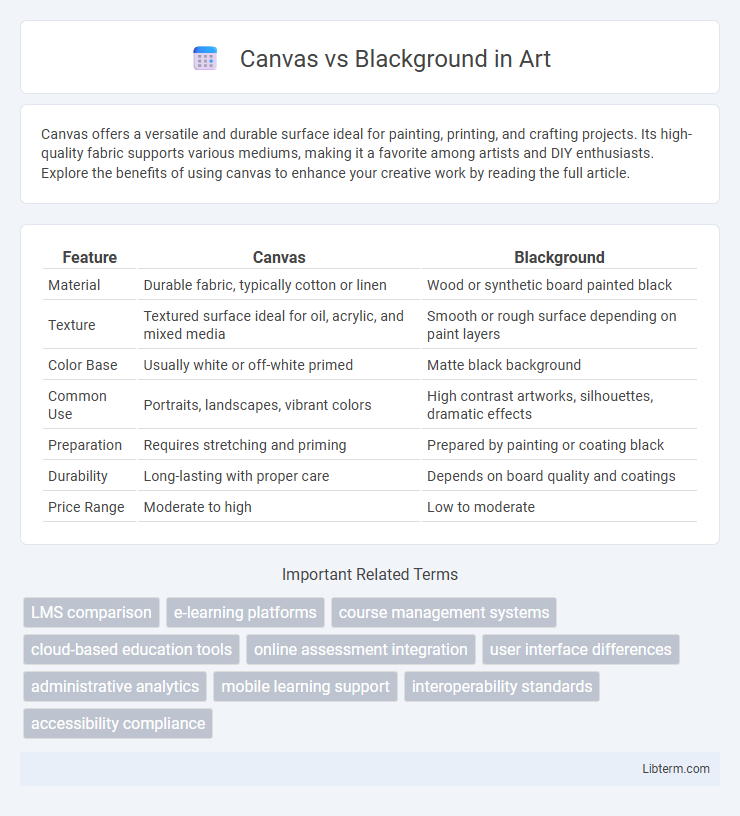Canvas offers a versatile and durable surface ideal for painting, printing, and crafting projects. Its high-quality fabric supports various mediums, making it a favorite among artists and DIY enthusiasts. Explore the benefits of using canvas to enhance your creative work by reading the full article.
Table of Comparison
| Feature | Canvas | Blackground |
|---|---|---|
| Material | Durable fabric, typically cotton or linen | Wood or synthetic board painted black |
| Texture | Textured surface ideal for oil, acrylic, and mixed media | Smooth or rough surface depending on paint layers |
| Color Base | Usually white or off-white primed | Matte black background |
| Common Use | Portraits, landscapes, vibrant colors | High contrast artworks, silhouettes, dramatic effects |
| Preparation | Requires stretching and priming | Prepared by painting or coating black |
| Durability | Long-lasting with proper care | Depends on board quality and coatings |
| Price Range | Moderate to high | Low to moderate |
Introduction to Canvas and Blackboard
Canvas and Blackboard are leading learning management systems (LMS) designed to enhance online education and training. Canvas offers a user-friendly interface with flexible tools for course creation, assignment management, and seamless integration with third-party apps, supporting both K-12 and higher education institutions. Blackboard provides comprehensive features including virtual classrooms, robust assessment options, and advanced analytics designed to facilitate collaborative and scalable e-learning environments.
Key Features Comparison
Canvas offers user-friendly design tools with drag-and-drop functionality, extensive template libraries, and real-time collaboration, making it ideal for creative and marketing projects. Blackground emphasizes project management with task tracking, customizable workflows, and advanced reporting features, facilitating team productivity and deadline management. Both platforms integrate with popular software like Google Drive and Slack, but Canvas excels in visual content creation, while Blackground focuses on structured project execution.
User Interface and Experience
Canvas offers a minimalist, intuitive user interface designed for seamless navigation and straightforward course management, enhancing overall user experience for both instructors and students. Blackground emphasizes a dynamic interface with customizable features and interactive tools, catering to users seeking a more tailored and engaging learning environment. User feedback highlights Canvas's simplicity and reliability, while Blackground's strength lies in its flexibility and innovative design elements.
Course Creation and Management
Canvas provides comprehensive course creation tools with customizable modules, assignment templates, and integrated multimedia support, streamlining course design and delivery for educators. Blackground emphasizes intuitive course management through real-time collaboration features, automated grading, and analytics dashboards that track student progress effectively. Both platforms offer robust content organization and assessment capabilities, but Canvas excels in scalability for large institutions, while Blackground caters to teams seeking dynamic interaction and feedback.
Communication and Collaboration Tools
Canvas offers integrated communication tools such as announcements, discussion boards, and real-time chat to facilitate seamless interaction among students and instructors. Blackground emphasizes collaboration through group workspaces, shared file repositories, and intuitive messaging systems designed for project management. Both platforms provide essential tools to enhance academic communication and teamwork, but Canvas integrates more synchronous communication features while Blackground focuses on asynchronous collaboration.
Integration and Compatibility
Canvas offers extensive integration capabilities with popular learning management systems (LMS) such as Blackboard, Moodle, and Google Classroom, enhancing seamless course management and content sharing. Blackboard maintains robust compatibility with a wide range of educational tools, including Turnitin and Zoom, supporting diverse pedagogical needs and fostering interactive learning environments. Both platforms prioritize API accessibility and support cross-platform functionality, facilitating smooth data exchange and interoperability in various educational settings.
Accessibility and Inclusivity
Canvas offers robust accessibility features such as screen reader compatibility, keyboard navigation, and customizable color contrasts, enhancing usability for individuals with disabilities. Blackboard includes built-in tools like Ally that automatically assess and improve content accessibility, supporting a diverse range of learners. Both platforms prioritize inclusivity by integrating multimedia captions and alternative text options, ensuring equitable access to educational resources.
Pricing and Licensing
Canvas offers a pricing model that includes monthly subscriptions starting at $12 per user with tiered options for individual, team, and enterprise plans, while also providing a free version with limited features. Blackground operates on a more customizable pricing structure often tailored to enterprise clients, typically requiring direct contact for quotes, emphasizing flexible licensing agreements. Both platforms grant users varying degrees of license scope, but Canvas's openly available subscription plans contrast with Blackground's more negotiation-based approach to pricing and licensing.
Security and Data Privacy
Canvas and Blackground both implement robust security protocols, but Canvas emphasizes compliance with FERPA and GDPR standards to protect student data privacy in educational settings. Blackground integrates end-to-end encryption and stringent access controls tailored for secure workplace collaboration, ensuring sensitive project data remains confidential. Both platforms prioritize data encryption in transit and at rest, but Canvas offers more granular user permission settings to safeguard academic records.
Choosing the Right LMS: Canvas or Blackboard
Choosing the right LMS depends on factors such as user interface, integration capabilities, and support for various learning styles. Canvas offers a modern, intuitive design with excellent mobile compatibility and extensive third-party integrations, while Blackboard provides robust customization and advanced assessment tools favored by large institutions. Evaluating your organization's specific needs in terms of scalability, ease of use, and technical support will help determine whether Canvas or Blackboard is the optimal learning management system.
Canvas Infographic

 libterm.com
libterm.com